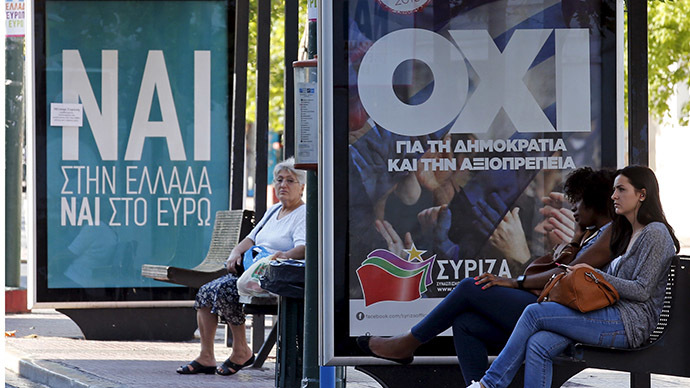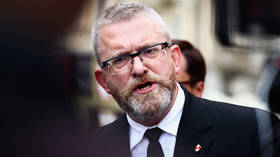Enough is enough! Greece votes ‘No’ to further austerity for cash

The Greek people have voted ‘No’ in a key referendum deciding whether to accept or reject the harsh bailout demands of international creditors. At stake, many commentators have said, is the country’s future in the eurozone and the EU itself.
A total of 4,800 polling stations across the country opened at 7:00 am local time (4:00 GMT) and closed at 7:00 pm.
Approximately 9.9 million Greeks have took part in the vote, which was labeled #Greferendum by the social media.
“Today, democracy trumps fear. Our people’s determination trumps fear. I am confident that tomorrow we will set a new course for all the peoples of Europe,” Tsipras said after casting his vote.
“No one can ignore the will of a people who are seeking to live with dignity, to live life on their own terms,” he added.
Finance Minister Yanis Varoufakis once again slammed Greece’s creditors for using “terrorist methods” against the debt-stricken nation.
Tsipras’s predecessor as prime minister, Antonis Samaras, of the rightist New Democracy party, told reporters that he had voted “Yes.”
“Today, we Greeks decide on the fate of our country,” Samaras said. “We vote ‘Yes’ to Greece. We vote ‘Yes’ to Europe.”
Voters were handed two ballots as they enter the booths – one contained the referendum question and the other, for those who wish to abstain, is blank.
“Should the deal draft that was put forward by the European Commission, the European Central Bank and the International Monetary Fund in the Eurogroup of June 25, 2015, consisting of two parts, that together form a unified proposal, be accepted?” the question read.
The people were asked to put “+” in either ‘No’ or ‘Yes’ boxes, while the use of any other symbol rendered the ballot invalid.
With the country’s economy on the brink of default, the interior ministry said that the holding the vote cost around €25 million, which is half the cost of the general election which took place in January, bringing the current anti-austerity government to power.
Sunday’s referendum in Greece was called by Greek Prime Minister Alexis Tsipras last week in order to add more clout to his negotiating position in the ongoing talks with the Troika of global lenders – the European Central Bank (ECB), European Commission (EC), and International Monetary Fund (IMF).
The negotiations have been stalled since June 25, after creditors declined to prolong a financial aid program for the struggling country or delay payments on earlier debts.
Speaking in front of a 25,000-strong rally in Athens on Friday, Tsipras urged the crowd to say a “proud ‘No’ to ultimatums” by the lenders, stressing that the plebiscite is about “staying in Europe, and deciding to live in dignity in Europe.”
Greek economic minister, Yanis Varoufakis, went a step further on Saturday, describing the actions of the Troika as “terrorism.”
“What they are doing with Greece has a name: terrorism,” Varoufakis told Spanish El Mundo paper. “Why have they forced us to close the banks? To make people frightened. And when it comes to spreading terror, this phenomenon is called terrorism.”
He said the country’s creditors want the people to say “Yes” to the bailout terms, so that “they could humiliate the Greeks.”
READ MORE: Varoufakis accuses Greece’s creditors of ‘terrorism’ ahead of crucial referendum












